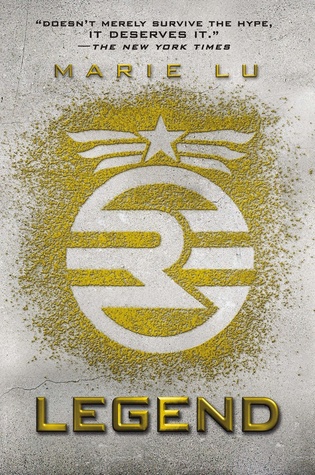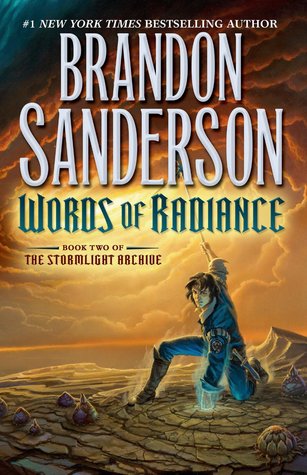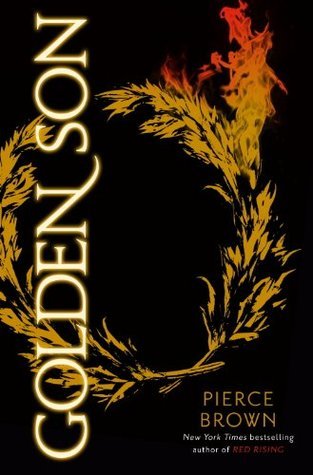Four stars. There was nothing I didn't like about this book: I loved both June and Day, the plot was solid, and the writing was easily understood and portrayed setting well. So why didn't it get five stars? It just left me feeling sort of "well, that was good." No crazy rushes to grab the next book, no end-of-book revelations that left me stunned. Emotionally, it just didn't really get me, and that is what I'd expect from a five-star book.
I'm not complaining though. As I said, there is nothing wrong with Legend. I quite enjoyed it.
One thing I really did admire was how well the double point-of-view was carried off. Oftentimes when there are two narrating characters, one will be more exciting than the other, resulting in my wanting to skip reading about half the book. Legend successfully avoided that - Day was a very sympathetic, intriguing character with lots of goals, and June was a very complicated girl who possessed traits which were almost opposites. Precise yet daring. Intelligent, but not just academically. Obedient to her superiors yet willing to break the law for what she believes. Day was intriguing in other ways. Mysterious past and motives, apparent selflessness despite his outward attitude, etc. I enjoyed reading about both of them.
That being said, the end was somewhat predictable. Maybe that comes with the genre, but I feel like there could have been something different about this dystopia. Evil government? Check. Oblivious people? Check. Revolutionaries? Check. It had a sense of deja vu about it. I was happy about the main character though. Instead of the typical girl who stumbles into the ugly truth about her big bad government, Legend gives you June (actually part of the big bad government) and Day (who already knows part of the ugly truth about the big bad government). That, at least, was refreshing.
So while I'm not jumping up and down because of this book, I was happy with it, and I do have the next book on order at the library.
The plot was so complicated, with so many threads and point of views which wove together to create a masterpiece. All the characters changed in some way, helping to accelerate the plot. I think one of the most beautiful things about Words of Radiance (and The Way of Kings) is how intrinsic character arcs are to the plot. The plot moving forward depends so much on the changes that need to happen within each character and it is gorgeous. And the world the story is set in breathes, it is so alive. You don't have to force yourself to envision the plants and animals and highstorms and Parshendi. Sanderson is a genius with words and does it all for you.
Ah, and the climax. The CLIMAX. The Way of Kings ended in a spectacular way that still has me floored, and Words of Radiance was absolutely no different. I can't even form a single cohesive thought to describe it. It was just stunning.
For years I've been a Harry Potter fan - it's the only series I've ever truly been obsessed with for so long. But . . . I think I love this series more. It is so rich that it will steal your breath with anticipation, prod you to laugh with wit, force you to gasp in horror with dread and disbelief, and wriggle and squeal on the couch with excitement. I promise that if you have the patience to commit to reading this book (after its predecessor, of course), it will be one of the best (if not the best) stories you'll ever experience.
Unquestionably five stars.
Eheheh . . . I guess you could say I like Brandon Sanderson.
I'll start with the one complaint I have about Resistance, though it is more about the marketing than the actual book. From the back-cover-blurb, and from other places online, Jace is said to be the main character. And while he does get some chapters written from his point-of-view in the beginning and at the end, throughout the middle of the book it was nearly entirely written from Kyrin's point of view. I feel like Kyrin should have just been named the main character instead - it would have been less misleading.
Despite that, I can't find much fault with the book itself. Actually, I read it for about six hours straight last night, staying up until 3:30 AM trying to finish the thing. It definitely grips you and doesn't let you stop reading. I did love Jace and couldn't wait to hear more about him - but unfortunately for me, there weren't many sections from his point-of-view and so I spent quite a lot of time impatiently reading through Kyrin trying to find more Jace. Kyrin wasn't bad though. I quite liked her too, in the end. In the beginning she cried a lot, and that got on my nerves after a while (I mean, she cried in pretty much every single chapter at first - I get that she had some major scary life changes going on, but she couldn't have had one tear-free chapter?), but I suppose it contributed to how much she changed over the course of the story. By the end she was much stronger, more confident, more independent, and I liked that.
I was also intrigued by the chief religion of Arcacia. Usually fantasy religions involve either an entire host of gods or just a single god. This one worshipped only two gods - not two major gods with a load of less-important gods under them, but just two gods. I wanted to know more about how this religion came to be. Also, I found it interesting how the followers of Elom seemed to be converted only through word of mouth. There was no equivalent to the Bible. I wondered how the followers even knew what they knew, what exactly their beliefs were. It would have been easy, with no text, for them to stray from the true original teachings over the years, and there were no places where the details of following Elom were explained. Knowing that Resistance is a Christian allegory, though, it was pretty easy to fill in the blanks. I've also heard that the sequel deals with the King's Scrolls, which sound like the equivalent of the Bible. I'm looking forward to that.
Also, I loved the concept of the ryriks. Why are they the way they are? What was all this about them leading a rebellion against Elom? Is it true that they have no souls, or does it just appear that way? I love this kind of worldbuilding, because it feels so complete despite not telling the reader everything. You can sense that there is more behind the hints dropped by the author, but you don't end up with a fantasy history lesson, and you discover things bit by bit.
Eheheh . . . I guess you could say I like Brandon Sanderson.
I'll start with the one complaint I have about Resistance, though it is more about the marketing than the actual book. From the back-cover-blurb, and from other places online, Jace is said to be the main character. And while he does get some chapters written from his point-of-view in the beginning and at the end, throughout the middle of the book it was nearly entirely written from Kyrin's point of view. I feel like Kyrin should have just been named the main character instead - it would have been less misleading.
Despite that, I can't find much fault with the book itself. Actually, I read it for about six hours straight last night, staying up until 3:30 AM trying to finish the thing. It definitely grips you and doesn't let you stop reading. I did love Jace and couldn't wait to hear more about him - but unfortunately for me, there weren't many sections from his point-of-view and so I spent quite a lot of time impatiently reading through Kyrin trying to find more Jace. Kyrin wasn't bad though. I quite liked her too, in the end. In the beginning she cried a lot, and that got on my nerves after a while (I mean, she cried in pretty much every single chapter at first - I get that she had some major scary life changes going on, but she couldn't have had one tear-free chapter?), but I suppose it contributed to how much she changed over the course of the story. By the end she was much stronger, more confident, more independent, and I liked that.
I was also intrigued by the chief religion of Arcacia. Usually fantasy religions involve either an entire host of gods or just a single god. This one worshipped only two gods - not two major gods with a load of less-important gods under them, but just two gods. I wanted to know more about how this religion came to be. Also, I found it interesting how the followers of Elom seemed to be converted only through word of mouth. There was no equivalent to the Bible. I wondered how the followers even knew what they knew, what exactly their beliefs were. It would have been easy, with no text, for them to stray from the true original teachings over the years, and there were no places where the details of following Elom were explained. Knowing that Resistance is a Christian allegory, though, it was pretty easy to fill in the blanks. I've also heard that the sequel deals with the King's Scrolls, which sound like the equivalent of the Bible. I'm looking forward to that.
Also, I loved the concept of the ryriks. Why are they the way they are? What was all this about them leading a rebellion against Elom? Is it true that they have no souls, or does it just appear that way? I love this kind of worldbuilding, because it feels so complete despite not telling the reader everything. You can sense that there is more behind the hints dropped by the author, but you don't end up with a fantasy history lesson, and you discover things bit by bit.
On the topic of ryriks, can I say again how much I love Jace? Poor guy! His struggle over the question "do I have a soul?" was something I've never read about before and it was refreshing. He wasn't just a Christian struggling over whether of not God's grace covered him - he was a Christian struggling over whether or not he even fit into the class of beings able to have any sort of afterlife at all. That, I think, was what really stood out about Resistance. I saw that the series is intended to be six books long and that makes me so happy. :) I can't wait for the rest of it! Five stars for Jace's struggle, Kyrin's character arc, and the ability to get me to forfeit sleep in order to read it.
Sorry for that last long-winded review. It was an intriguing book, and yes, you should read it.
My first thought when I finished reading this was "oh GOSH." Then, "NONONONONONONONONO." When I found out that the sequel, Morning Star, hasn't been released yet, I nearly started pulling my hair out. So the first thing to take away from this review is: don't read yet unless you're prepared for a MASSIVE cliffhanger. *shakes fist at Pierce Brown*
I gave the book five stars because of how it ended. Like any good book in the middle of a series, it left me practically dying for the next book and wailing because it isn't available yet. However, there were some things that bothered me while I read Golden Son. One, the amount of killing going on. Yes, it was realistic. Yes, all the characters (except possible Darrow) seem to have next to no moral standards. But most of the deaths were in sheer brutality and vengeance killing. Don't read unless you can stomach some brutal violence. I especially disliked Lorn when (view spoiler) I despite that character. It ruined one of the most morally clean moments in the entire book.
Speaking of the death toll in the story, remarkably little time is spent grieving. Apart from Darrow's grief over Eo, no one seems to care much about anyone else who has died for more than a day after the death. And that bugged me.
I can't deny that I enjoyed the story, though. Golden Son is a definite page-turner and doesn't leave you relaxed for a moment. The ending is still blowing me away. WHY. I feel like it is more of a plot-driven story, so the characters aren't the most developed I've ever seen, but they're not bad at all. Cassius, Darrow, Sevro, Roque, and Victra were the ones with the most personality, I think, and were the most unique. Notice that the protagonist is in that list? What a relief to have a well-developed and multi-layered narrator.
In short, if you can take some brutality, violence, and swearing, and really want a riveting and intense book, go ahead and read Golden Son. You probably won't be able to put it down.
My first thought when I finished reading this was "oh GOSH." Then, "NONONONONONONONONO." When I found out that the sequel, Morning Star, hasn't been released yet, I nearly started pulling my hair out. So the first thing to take away from this review is: don't read yet unless you're prepared for a MASSIVE cliffhanger. *shakes fist at Pierce Brown*
I gave the book five stars because of how it ended. Like any good book in the middle of a series, it left me practically dying for the next book and wailing because it isn't available yet. However, there were some things that bothered me while I read Golden Son. One, the amount of killing going on. Yes, it was realistic. Yes, all the characters (except possible Darrow) seem to have next to no moral standards. But most of the deaths were in sheer brutality and vengeance killing. Don't read unless you can stomach some brutal violence. I especially disliked Lorn when (view spoiler) I despite that character. It ruined one of the most morally clean moments in the entire book.
Speaking of the death toll in the story, remarkably little time is spent grieving. Apart from Darrow's grief over Eo, no one seems to care much about anyone else who has died for more than a day after the death. And that bugged me.
I can't deny that I enjoyed the story, though. Golden Son is a definite page-turner and doesn't leave you relaxed for a moment. The ending is still blowing me away. WHY. I feel like it is more of a plot-driven story, so the characters aren't the most developed I've ever seen, but they're not bad at all. Cassius, Darrow, Sevro, Roque, and Victra were the ones with the most personality, I think, and were the most unique. Notice that the protagonist is in that list? What a relief to have a well-developed and multi-layered narrator.
In short, if you can take some brutality, violence, and swearing, and really want a riveting and intense book, go ahead and read Golden Son. You probably won't be able to put it down.
Have you read any of these? What did you think of them? Are you going to try reading any of them now? (Sandersooonnnnnnn....read iiiiiiitttttt...The Stormlight Archives....yeeeesssssss...) Do you have any recommendations for me based on these?








